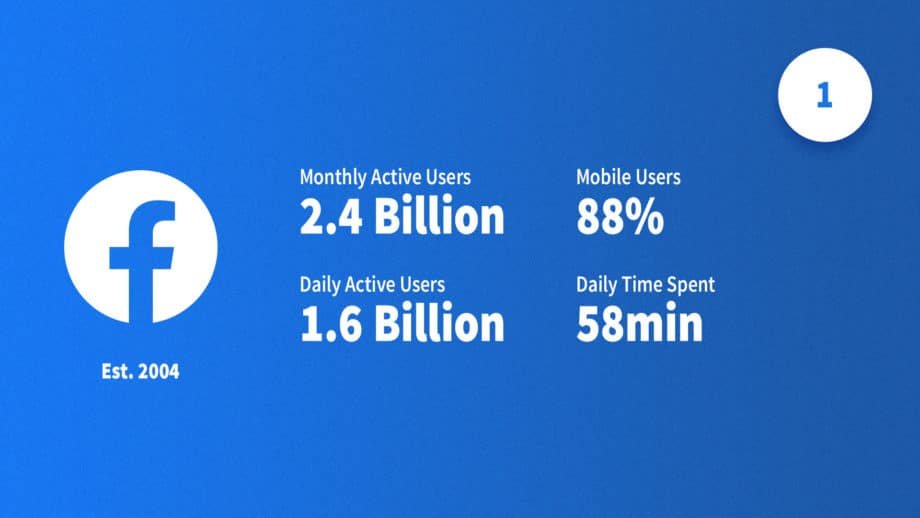If you’ve followed social media trends at all, you’ve probably heard the same story over and over again—Facebook is dying. This narrative has surfaced multiple times throughout the years, and here we are, hearing it again. But is it true? Not really. It all depends on how you interpret the facts.
People have been predicting the fall of Facebook for years, often pointing to its age or the rise of newer, trendier platforms. It’s the same old story recycled by those who claim to know better, but reality paints a different picture.

Facebook: More Than Just a Social Network
Let’s start with a key observation that many seem to miss: Facebook has evolved beyond being just a cool social platform. It’s become utilitarian, much like a necessary piece of furniture in your home. Just like you need a couch, many people need Facebook—whether for staying in touch with friends, joining groups, or even shopping on Facebook Marketplace. A recent story highlighted someone who bought their furniture on Marketplace, which feels like an apt metaphor: Facebook is part of the digital furniture in our lives. People might not rave about it, but they still use it daily.
Misreading the Market: What Critics Don’t Understand
The market seems to misinterpret what’s actually going on. There’s this constant narrative about social media users abandoning Facebook for the next big thing, but the reality is a lot of people grew up with Facebook. It’s familiar, comfortable, and reliable—that’s why they continue to use it. Social media platforms like Facebook aren’t just about being “cool”; they’re about being functional and fitting into everyday life.
One big reason people stay on Facebook is simple: they want to hang out with their friends. That’s it. They don’t need all the drama or chaos; they just want a space to connect with people they care about. Yet, this basic truth often gets ignored by critics who are too busy analyzing superficial trends.
The Real Issue: Algorithms, Not the Platform Itself
A lot of dissatisfaction with Facebook isn’t even about the platform itself—it’s about things like algorithms that misunderstand colloquial language or make odd content moderation decisions. These are issues that users have with the system, not necessarily the idea of Facebook. The platform itself remains a convenient tool for billions.
Misinterpreting User Stats: A Classic Mistake
When critics point to user statistics, they often misinterpret them. Sure, user stats are important, but they don’t directly translate into revenue—potential dollars, yes, but not guaranteed profit. That’s because social media advertising, in general, is still incredibly underdeveloped. Where are the exclusive deals or discounts for Facebook users? The lack of innovation in social media marketing is one of the reasons people get frustrated with online ads.
Facebook has over 2 billion active users, and yet, much of its marketing potential remains untapped. Ignoring this massive user base is a mistake, and better marketing strategies could definitely shift Facebook’s metrics.
It’s Not a Mainstream Media Outlet
One of the most common misconceptions is treating Facebook as if it’s the same as mainstream media. It’s not. Facebook is a multi-level platform that serves different types of users for different purposes. Whether you’re a casual user keeping up with friends or a business owner running ads, Facebook caters to a wide range of needs. Criticizing it based on individual metrics misses the bigger picture.
The Age Debate: Old vs. New Platforms
Then there’s the argument about age—Facebook is old, and young people are leaving for newer platforms like TikTok. But that’s an oversimplification. Kids have always rebelled against what their parents use, and this cycle will continue. One day, even TikTok will be considered “old.” The idea that youth defines the value of a social media platform is short-sighted.
Facebook’s Evolution: A Balancing Act
It’s clear Facebook is trying to evolve, but it’s caught in a tough position. It’s criticized for not doing enough to stay relevant, but when it tries to innovate, it’s blasted for that too. Striking the right balance between keeping long-time users happy and adapting to new trends is tricky, but Facebook is still very much in the game.
What the Analysts Get Wrong
Years ago, when Facebook went public, many analysts didn’t fully understand its business model. Fast forward to today, and not much has changed. They still don’t grasp how Facebook works—both on the front end with users and on the back end with issues like content moderation and security. Facebook moderators, for example, deal with a flood of inappropriate content daily, which is a major challenge critics often overlook.

But the biggest misunderstanding is this: social media is a discretionary market. Users want to interact with platforms on their terms. Facebook, with its vast array of features, is essentially a collection of useful tools all in one place. It’s not hard to see why that remains appealing.
The Bottom Line: Facebook Isn’t Dying
Despite the headlines, Facebook isn’t dying. It’s adjusting to the same market trends it’s faced for years. People still use it, even if it’s not as “cool” as it once was. The narrative of Facebook’s demise is just noise—business as usual in the ever-evolving social media landscape. The platform has over 2 billion active users, and while it faces challenges, the core trends haven’t shifted dramatically.
So, no, Facebook isn’t “dying again.” It’s simply misunderstood. Maybe one day, critics will take the time to study the dynamics of social media. Until then, it’s safe to say that Facebook isn’t going anywhere.
Conclusion
The article takes a closer look at the idea that Facebook is “dying,”emphasising that the platform remains essential for billions of users despite facing criticism. It highlights Facebook’s evolution into a utilitarian tool for connection, akin to necessary furniture in daily life.
Key points include the misinterpretation of user statistics, the need for improved marketing strategies, and the platform’s adaptability to changing trends. Ultimately, the conclusion asserts that Facebook is not obsolete but rather misunderstood, continuing to play a significant role in the social media landscape. Critics may overlook its enduring relevance and utility, as Facebook adjusts to meet the needs of its diverse user base. As second-hand shopping gains popularity, consumers must remain vigilant against scams targeting platforms like Facebook Marketplace and Vinted.
Disclaimer
The opinions expressed in this Op-Ed are those of the author. They do not purport to reflect the opinions or views of UK Profits or its members.
FAQs
1. Is Facebook really dying?
No, despite repeated claims that Facebook is dying, it continues to have over 2 billion active users. The platform is evolving and remains a vital tool for social connections, businesses, and more.
2. Why do people say Facebook is dying?
People often say Facebook is dying due to the rise of newer platforms like TikTok and because younger users may prefer trendier options. However, Facebook is still widely used for its practicality and diverse features.
3. How is Facebook adapting to new trends?
Facebook is constantly innovating to balance the needs of its long-time users while introducing features to stay relevant. This includes enhanced Marketplace features, expanded advertising options, and efforts to improve content moderation.
4. Why do people still use Facebook if it’s considered “uncool”?
Many people continue to use Facebook because it’s reliable, familiar, and functional. Whether it’s for keeping in touch with friends, participating in groups, or running businesses, Facebook remains a valuable tool in everyday life.
5. How do Facebook’s user stats reflect its popularity?
While some may argue Facebook’s user numbers are declining, the platform still boasts over 2 billion active users. Many critics misunderstand that Facebook’s value lies in its functionality, not just its user statistics.